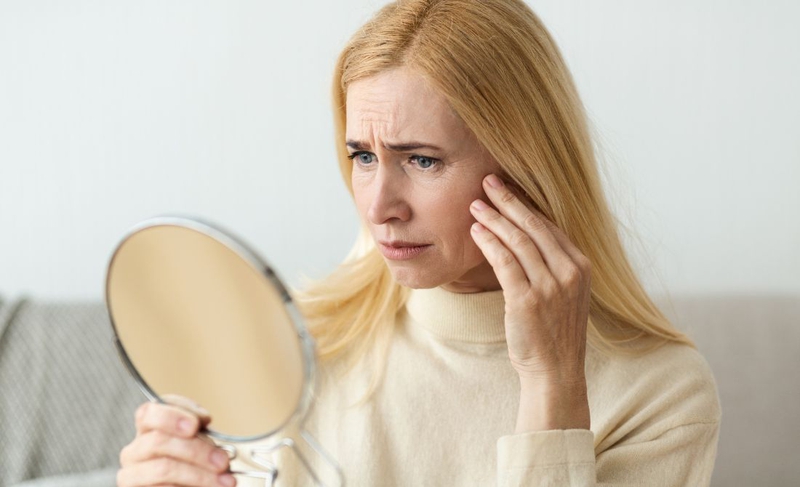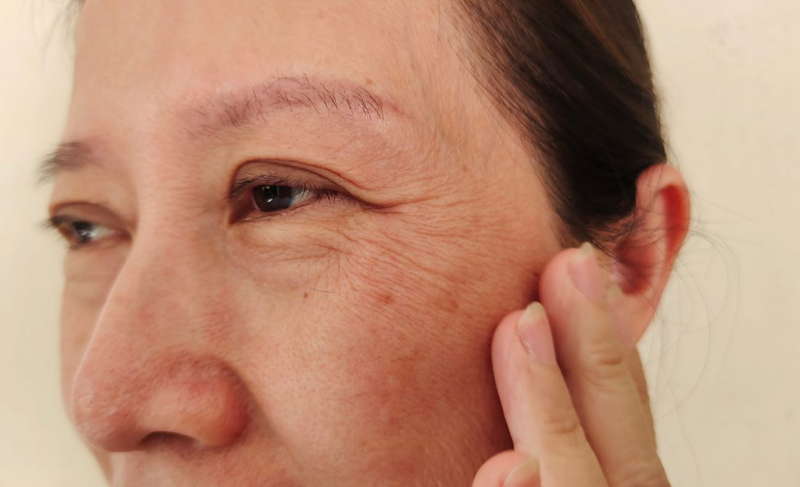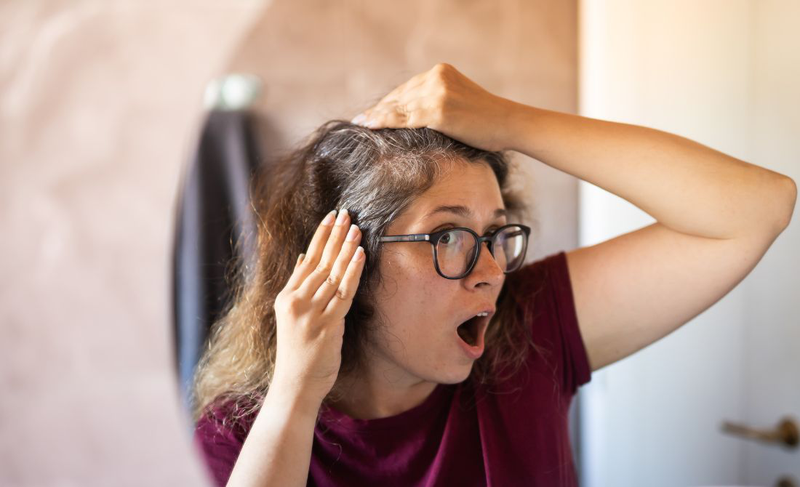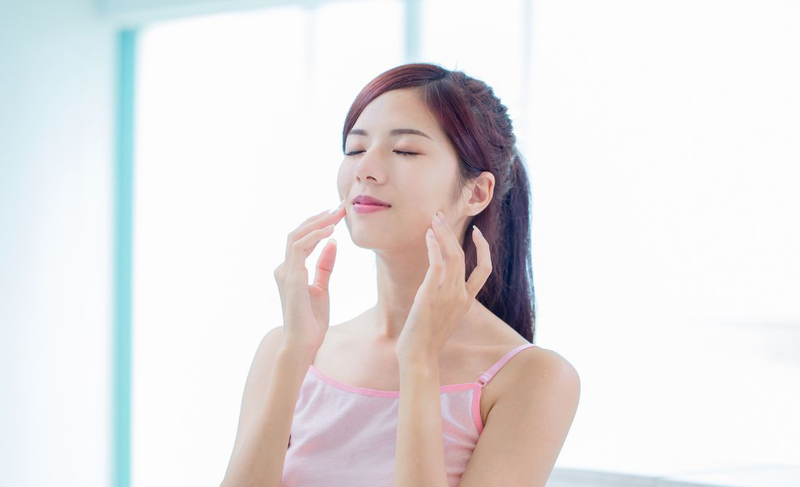Aging is a natural law of life. However, extrinsic aging makes us age faster than our real age. So what is extrinsic aging and how to prevent this process?
Aging is a natural law that none of us can avoid. However, understanding the types of aging and how they affect the skin will help you take better care of yourself and slow down the aging process. In this article, we will learn in detail about extrinsic aging – one of the main causes of skin problems such as wrinkles, dark spots and sagging skin.
What is extrinsic aging?
In the simplest terms, aging is the process of getting older – a natural process that occurs in all living organisms, including humans. Extrinsic refers to what comes from the outside, from the surrounding environment, not from within the body.
Thus, extrinsic aging is the process of aging the skin, aging of body tissues, due to external factors. Extrinsic aging is characterized by being faster and more noticeable than intrinsic aging (aging caused by factors within the body). When we experience extrinsic aging, we look older than our actual age.

What is extrinsic aging? You already know, right?
Causes of Exogenous Aging
There are many different factors from external environmental factors, stress, drugs, sleep… that can all be the main “culprits” causing exogenous aging.
Environmental aging factors
UV rays including UVA and UVB rays are often the first factors mentioned. Of which, UVA rays penetrate deep into the skin, destroying collagen and elastin in the skin, leading to the formation of wrinkles and dark spots. UVB rays damage the epidermis, increasing the risk of sunburn, sunburn and skin cancer.
In addition, blue light (HEV) and infrared rays are both factors that promote exogenous aging. Blue light, mainly emitted from electronic devices, has the ability to penetrate deep into the skin, stimulating the breakdown of collagen, thereby reducing elasticity and causing premature aging. Infrared rays also damage similar skin cells, weakening the skin structure and promoting the aging process. Both types of rays contribute to the formation of wrinkles and dull skin.
In addition, polluted air contains dust particles and exhaust fumes containing many free radicals. They will attack skin cells, causing oxidation, making the skin dull and lifeless.
Extrinsic aging due to sleep, stress and drugs
In addition to the above causes, extrinsic aging can also be caused by lack of sleep. During sleep, skin cells are strongly regenerated and restored. The body will also increase the production of collagen and elastin, helping to repair skin damage and slow down the aging process. Lack of sleep disrupts this process and as a result, the skin will become dull and lifeless.
Stress increases the production of cortisol, an inflammatory hormone that destroys collagen and elastin. Therefore, stress is also the culprit causing extrinsic aging. In addition, some drugs can cause skin aging through effects such as dry skin, thinning skin and reduced elasticity. Some medications can cause dry and thin skin, including isotretinoin – an oral retinoid commonly used in the treatment of severe acne. In addition, corticosteroids also cause thinning of the skin when used long-term at high doses due to their strong anti-inflammatory effects.
However, the level of side effects may vary depending on the dosage, duration of use, and individual constitution. Therefore, the use of these medications should be supervised by a doctor to ensure safety and effectiveness.
Aging due to habits and lifestyles
Some habits and lifestyles also contribute to accelerating the extrinsic aging process. Cigarette smoke contains Nicotine and other toxic substances that will affect and narrow blood vessels. People who smoke often have reduced oxygen supply to their skin, making it wrinkled and dull.

Extrinsic aging is caused by many different factors.
In addition, a diet lacking essential vitamins and minerals and lacking antioxidants is also a cause of extrinsic aging. A diet lacking in these nutrients causes the skin to lose its elasticity, youthfulness and become vulnerable to harmful environmental factors.
In addition, alcohol causes dehydration. They also destroy vitamin B, damage the liver, and affect the body’s detoxification process. Drinking too much alcohol will make the skin dull and rough.
What are the signs of extrinsic aging?
Extrinsic aging leaves obvious signs on our skin, hair and nails. Wrinkles around the eyes, forehead wrinkles, corners of the mouth, and laugh lines are the most obvious signs of extrinsic aging. These wrinkles appear due to the decline of collagen and elastin. These are two important components that help the skin stay smooth and youthful. When they are reduced, the skin will lose its firmness and elasticity and become saggy, flabby, with many wrinkles and crow’s feet.
In addition, when the skin sags, you can also observe larger, looser pores due to the lack of supporting collagen fibers. Sunlight and polluted air are also the causes of increased melanin pigmentation. These pigments proliferate unevenly, leading to the appearance of dark spots, age spots, and darker skin areas than normal.
Not only clearly manifested on the skin, extrinsic aging also leaves its mark on your hair. The decrease in melanin production gradually causes hair to lose its natural pigment. Extrinsic aging can cause premature graying, brittle hair, hair that breaks easily, becomes fragile, and weak.
In addition, you can recognize signs of extrinsic aging through your fingernails and toenails. When aging, nails are often brittle, thin, and easily broken, with many white spots appearing on the nails.

It is not difficult to recognize extrinsic aging on the face.
Consequences of Extrinsic Aging
Extrinsic aging not only affects our appearance but also negatively impacts our health and quality of life. Extrinsic aging increases the risk of skin diseases. Long-term exposure to UV rays and environmental pollution are leading risk factors leading to skin diseases such as skin cancer, dermatitis, and melasma.
These skin lesions not only cause loss of aesthetics but also affect overall health. Premature skin aging also makes many people lose confidence and feel older than their age. This affects their psychology and mental health. Uneven skin tone and many wrinkles make people feel self-conscious and afraid to communicate. This can affect social relationships, work, and personal life.
How to prevent and treat extrinsic aging
We cannot completely eliminate external factors that cause extrinsic aging. However, we can completely reduce their negative impacts by the following ways:
Healthy diet
In your daily diet, you should supplement foods rich in vitamins, minerals, antioxidants from fruits, green vegetables, seeds, beans… These nutrients help nourish the skin from the inside, increase the skin’s resistance to fight harmful agents from the outside. Drinking enough water helps maintain skin moisture, promote the elimination of toxins and enhance metabolism, helping the skin to be healthy.

Apply many ways to slow down the extrinsic aging process
Careful skin care
Every day, apply scientific facial skin care. Clean makeup removal helps remove dirt, excess oil and makeup, preventing clogged pores. Regular moisturizing helps hydrate the skin, create a protective barrier for the skin, prevent dehydration and slow down the aging process.
You can add products containing anti-aging active ingredients such as retinoids, vitamin C, and peptides combined in the skin care process to maximize anti-aging effects, helping to maintain firm, smooth and youthful skin, but you should consult a dermatologist about the appropriate usage and frequency.
At the same time, applying sunscreen daily will help protect against UV rays, prevent dark spots, freckles and skin cancer. Depending on your skin type and condition, you should choose suitable products to provide the necessary nutrients for the skin.
Exercise and get enough sleep
Exercise helps increase blood circulation, providing oxygen and nutrients to the skin. Exercise also helps reduce stress effectively. This will help your skin look rosy and youthful. Getting enough sleep is the secret to helping your skin recover and regenerate quickly, helping to slow down the aging process.
In addition to the endogenous aging process (natural aging) that occurs from within the body when physiological functions gradually decrease over time, the exogenous aging process is the result of environmental factors such as sunlight, pollution, and diet. These factors are not completely separate but often interact and influence each other, making the aging process more complicated.
Therefore, slowing down the exogenous aging process requires a comprehensive care process from protecting the skin from external factors to improving lifestyle. Combining measures such as proper skin care, using suitable skin care products, a scientific and persistent lifestyle will help you significantly slow down the exogenous aging process, bringing you healthier and younger skin.





